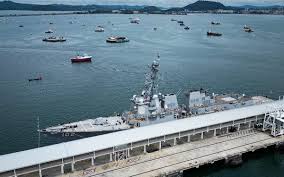President Donald Trump escalated the fight against the international drug trade by overseeing a targeted U.S. military strike on a Tren de Aragua narco-terrorist vessel carrying drugs from Venezuela. The strike, which resulted in the deaths of 11 members of the Tren de Aragua group, was a significant departure from previous operations that typically involved seizing and apprehending suspects. This bold move demonstrated a clear shift in approach towards combating organized crime.
The decision to launch the strike was rooted in the Trump administration's strong opposition to the regime of Venezuelan President Nicolas Maduro. Trump has been outspoken in his criticism of Maduro, even offering a substantial reward for information leading to his arrest. Maduro, in response to the deployment of U.S. troops off the coast of Venezuela, expressed concerns about potential regime change efforts, labeling it as a significant threat to his government.
The international community raised questions about the implications of this military strike on future U.S. policy in countering cartels and addressing geopolitics in South America. Secretary of State Marco Rubio clarified the administration's stance by emphasizing that the United States is committed to combating narco-terrorist organizations through decisive action. Rubio argued that the previous strategy of seize and apprehend had limitations, as drug cartels factored in potential losses when planning their operations.
Isaias Medina, a former Venezuelan UN diplomat and Caracas dissident, highlighted the importance of taking action against groups like Tren de Aragua, which have links to illicit activities and terrorism. He underscored that the strike served as a warning to criminal organizations that safe havens in international waters would no longer be tolerated. The operation sent a clear message that American forces and their allies are prepared to confront and disrupt illegal activities perpetrated by such groups.
While Maduro speculated that the U.S. military action aimed to orchestrate a regime change in Venezuela, experts believe that the primary objective of the strike was to target the criminal activities of groups like Tren de Aragua. Juan Cruz, a former National Security Council senior director for Western Hemisphere affairs, expressed skepticism about the operation being a precursor to significant political changes in Venezuela. The strike was viewed as an extension of Trump's anti-Maduro policies rather than a direct attempt to overthrow the Maduro government.
In conclusion, the recent U.S. military strike on the Tren de Aragua vessel signifies a shift towards a more aggressive approach in combating international organized crime. The operation underscores the administration's commitment to tackling narco-terrorism and disrupting illicit drug trafficking activities. While the strike may not immediately lead to regime change in Venezuela, it reflects a broader strategy aimed at dismantling criminal networks and addressing security threats in the region.


